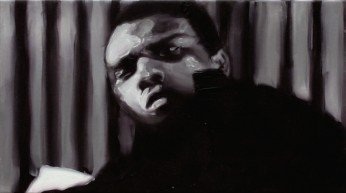Pawel Ksiazek
dal 10/5/2007 al 22/6/2007
Segnalato da
10/5/2007
Pawel Ksiazek
Zak Gallery, Berlin
Africanized Honey Bees

Africanized Honey Bees
The africanized honey bee originated 50 years ago from a promising
crossbreed of European and African bees and spread themselves
astoundingly fast throughout the american continent. Thus the highly
productive and adaptive race proved also to be exceptionally aggressive.
The danger of the "killer bees" was played up by the media, which
provoked fear and exaggerated precautionary measures.
Introduced as a beneficial improvement, the exaggeration of the
represented danger now covers up the factual usefulness of the bees. In
a scene from his film "Bowling for Columbine," Michael Moore compares
this process with the emergence of racial hatred. Paweł Książek reverts
back to this analogy, which is the defining point of his newest series:
"Africanized Honey Bees," or AHB.
For many years Książek has worked consistently on self-contained series
that deal with specific topics. His painting and installations translate
the materials of his research into images of great expressiveness and
ambiguity. Through the unusual contextualisation, seemingly
inconspicious details are provided a profound and uncomfortable meaning.
In AHB Książek works with the image of the "killer bee" as the American
media conveys it, and draws p p arallels to the representation of
African Americans in the history of American film and photography. They
are images that lay claim to objectivity and thus always clearly
polarize: negative aspects are placed in the foreground and positive
sides are faded out. This procedure simultaneously challenges and
reflects the development of xenophobia and racism
In his abstract image-language, the artist remains withheld. He does not
insist upon one possible evaluation, but confronts his viewers with the
core problem. We are meant to draw our own conclusions.
Książek himself compares his work with a judicial proceeding in which he
is not passing the judgment, but reviews the evidence, and assigns the
viewer the roll of a jury member. If even this approach permits an act
of syllogism, or if the judgment should not be unanimous, then the
process still remains independent and creative in itself. The
reflections provoked cause the viewer to continue thinking, and draw
logical parallels, which are worth following further.
Paweł Książek (born 1973) studied at the Academy of Fine Arts in Krakow
(Poland) and at the HfG Offenbach (Germany, DAAD scholarship). In the
last year he took part in the most important group shows concerning
Polish painting, and was presented in individual exhibitions in Poland
and abroad. With the series "Africanized Honey Bees" ŻAK GALLERY shows
the artist's first solo exhibition in Germany.
Zak Gallery
Linienstrabe 148 - Berlin
Free admission



